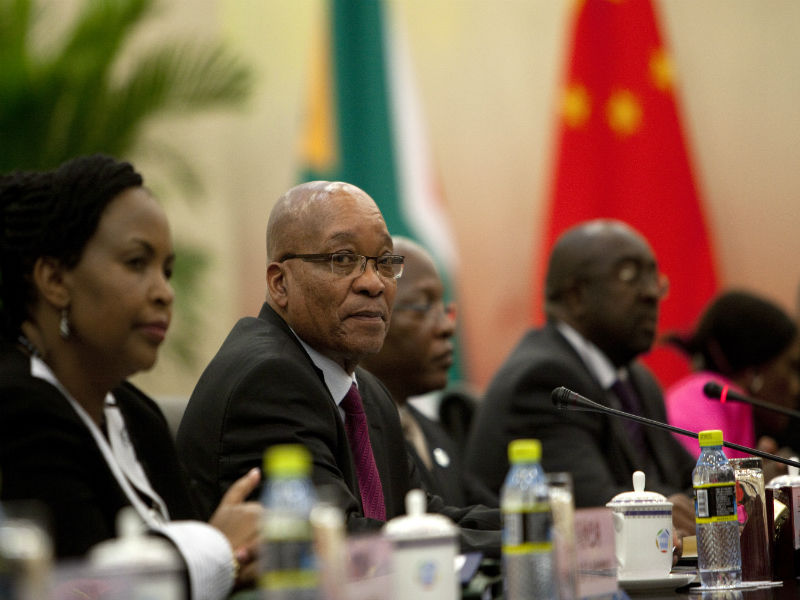[BRICS-Xiamen]Working Together for a Second Golden Decade of BRICS Cooperation

 In September, BRICS leaders will meet in the Chinese city of Xiamen for the Ninth BRICS Summit. As they meet during the harvest season, BRICS leaders will discuss development plans, build strategic consensus and jointly draw up an ambitious blueprint for BRICS cooperation over the next decade.
In September, BRICS leaders will meet in the Chinese city of Xiamen for the Ninth BRICS Summit. As they meet during the harvest season, BRICS leaders will discuss development plans, build strategic consensus and jointly draw up an ambitious blueprint for BRICS cooperation over the next decade.
This is the second meeting held by China as the BRICS chair. At the last meeting when China chaired the organization, South Africa was officially accepted as a BRICS member. In April 2011, President Zuma visited Sanya, China, attending the BRICS Summit for the first time. In the past six years, South Africa has joined hands with other BRICS members to promote BRICS cooperation, opening a new chapter of friendship and cooperation between BRICS and African countries.
South Africa’s joining BRICS is tremendously significant for the development of the BRICS’ cooperation, which is a new mechanism representing the cooperation between emerging economies in the international community. The addition of the “S” to the BRIC acronym indicates that the mechanism enters the African continent which has the largest number of developing countries. BRICS is now associated with four continents, and has become more representative, with greater economic weight and a louder voice. This has laid a solid foundation for developing countries, including African countries, to be involved in the deliberation and decision-making of international affairs on an equal footing. As the only African country in BRICS, South Africa is a natural bridge between BRICS and the entire continent, playing an important role in helping BRICS enhance its representativeness, increase its strength of cooperation, promote cooperation between BRICS and Africa in maintaining peace, gaining development and facilitating regional integration. As the leading African emerging economy, South Africa has irreplaceable strengths in geographic location, natural resources, know-how and talent resources, making itself an indispensable BRICS partner in Africa. After joining BRICS, South Africa has made constant efforts for the progress of BRICS cooperation mechanisms. Many important cooperation mechanisms such as the New Development Bank, BRICS Contingent Reserve Arrangement, BRICS Business Council, and BRICS Think Tank Council were decided at the 2013 BRICS Summit, hosted by South Africa in Durban.
BRICS cooperation has also created tangible benefits for South Africa and Africa. In recent years, uniting and speaking with one voice in the United Nations, the G20 and other various institutions of global governance, BRICS has actively promoted a world that is fair, just, inclusive and orderly. By responding actively to Africa’s aspirations for addressing climate change, realizing sustainable development, and combating terrorism, BRICS firmly upholds the shared interests of all developing countries. For African countries, no issue is more pressing than development. During the G20 Hangzhou Summit in 2016, China joined South Africa and other BRICS partners in developing the Action Plan on the 2030 Agenda for Sustainable Development. It was the first time that the G20 adopted collective action to support the industrialization of Africa and least developed countries. During the recently concluded G20 Hamburg Summit, BRICS partners called on the G20 to follow the consensus of the Hangzhou Summit regarding the improvement of peace and development in Africa. With the upcoming official launch of the African Regional Center of the New Development Bank, BRICS cooperation will surely make greater contributions to infrastructure development and sustainable growth in Africa. Cooperation between BRICS and Africa will also serve as a role model to further encourage the rest of the international community to work with Africa to explore potential and create greater opportunities for African countries to realize sustainable development.
As key members of BRICS, both China and South Africa have been builders, contributors and beneficiaries of BRICS cooperation. In recent years, mutually beneficial cooperation between China and South Africa in fields of ocean economics, industry production capacity, economic special zones, infrastructure construction, human resource development, tourism, financial services and other realms have ensured constant progress and breakthroughs, and cooperation has been upgraded from conventional flow of trade to high value-added cooperation in investment and industry. South Africa has become China’s biggest trading partner and the most important investment and tourist destination in Africa. Today, around 160 large and medium-sized Chinese companies are doing business in South Africa, with total investment of over US$15 billion. South Africa’s Home Appliance Manufacturing Industrial Park and Heavy Truck Factory funded by Chinese investment created over 20,000 jobs for the local population. Home to the first RMB clearing bank in Africa, South Africa is leading the development of the offshore RMB market in Africa. Great progress has also been made in science park cooperation between China and South Africa, which has resulted in the first China-Africa park with focus on technology innovation. Leading Chinese telecommunications company Huawei established its first African innovation center in South Africa and promised to train 1,000 IT experts in South Africa within five years. People-to-people exchange between China and South Africa is thriving. South Africa has become the top African destination for Chinese tourists, immigrants and international students.
In the rapidly changing and highly complex global environment today, BRICS countries face more common tasks: strengthening unity and cooperation, maintaining domestic stability and development, fostering a favorable international environment and creating an international order that is more just and equitable. BRICS should strive to boost development, stabilize peace, accelerate reform and promote greater BRICS cooperation.
First, BRICS should work on tighter mutually beneficial cooperation. Since the international financial crisis, BRICS has strived to work in joint efforts as an anchor and a driving engine for world economic recovery against the backdrop of low economic ebb. In the last decade, the percentage of the economic aggregate of BRICS in the world economy rose from 12 percent to 23 percent, total trade volume from 11 percent to 16 percent and foreign investment from 7 percent to 12 percent. BRICS has contributed more than half of global economic growth. The future is indeed bright for BRICS economic development and mutually beneficial cooperation. In the future, BRICS members will work to build a strategic cooperative partnership for economic development, employing each other’s strengths, dovetailing each other’s demand, and deepening mutually beneficial cooperation. BRICS will continue to support the industrialization of South Africa and other African countries to realize win-win cooperation and common development.
Second, BRICS should work on creating stronger global governance capabilities. In the last decade, the BRICS cooperation mechanism has grown into multi-dimensional, multi-layered cooperative framework thanks to regular meetings of state leaders and with support from conferences of senior representatives on security, foreign ministers and other senior officials of the ministerial level. As a model and important platform for South-South cooperation in the new era, BRICS is playing an increasingly significant role in global governance. In the future, BRICS should further strengthen coordination in the UN, the G20, IMF, World Bank, WTO and other international platforms, speak with one voice to safeguard the common interests of developing countries, including African countries, and make greater contributions to the improvement and modernization of global governance.
Third, BRICS should work on promoting closer people-to-people and cultural exchanges. All BRICS countries have time-honored history and rich culture and together form a colorful picture of the diversity of human civilization. Therefore, strengthening BRICS people-to-people and cultural exchanges will contribute greatly to the promotion of mutual understanding, friendship and trust among the peoples of the BRICS countries as well as mutually beneficial cooperation around the world. The Year of South Africa in China and the Year of China in South Africa in 2014 and 2015, respectively, were successfully held, becoming new events in China-Africa relations. In April of this year, China and South Africa launched the first high-level people-to-people and cultural exchange mechanism, starting a series of exchange events between China and South Africa and between China and other African countries, in the fields of culture, education, health, media and youth. The success of this mechanism offers good reference for BRICS to carry out people-to-people and cultural exchanges with developing countries. In the future, BRICS should further strengthen cooperation in the fields of culture, arts, sports, media, think-tanks and health to win popular support for BRICS cooperation, strengthen its inner strength, and increase its popularity.
From the 2011 BRICS Sanya Summit to the 2017 BRICS Xiamen Summit, South Africa and other African countries have further engaged in BRICS cooperation, and BRICS has made great progress. We strongly believe that the Ninth BRICS Summit in Xiamen will be a great success – as we celebrate past achievements and map out an ambitious blueprint for yet another Golden Decade of BRICS cooperation!
(The author is the Chinese ambassador to the Republic of South Africa.)